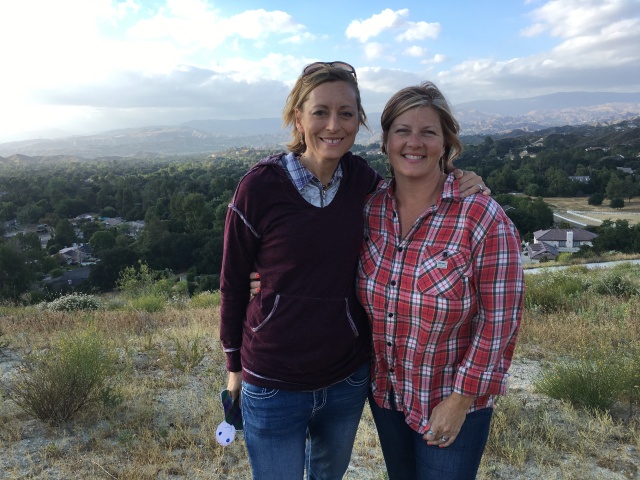
Marla is a preparedness expert/mom who lives in a major wildfire and earthquake zone: Southern California. I met Marla at the start of ninth grade when I took a two year break from public school to attend a small, Christian private school in Syracuse, NY (where I grew up). Ironically, I was going through my rebellious/class-clown phase during those two years (not so compatible with a strict Christian school), and Marla was my very first friend; we met at my locker. We’ve kept in touch all these years and I visited her a year and half ago at her home in California and that’s where this interview began. In this interview, Marla discusses the top three ways a family (or individual) can be prepared for a disaster, how to approach thinking about the unexpected, the number one thing you need during an emergency, social unrest and the zombie apocalypse, and how her house literally almost burned down due to an out-of-control wildfire. I interview her from her well-stocked underground bunker in California. (Kidding…her garage is well stocked, but no bunker.)
Heather: Marla, last year you had a wildfire almost burn your house down. Please tell us what happened.
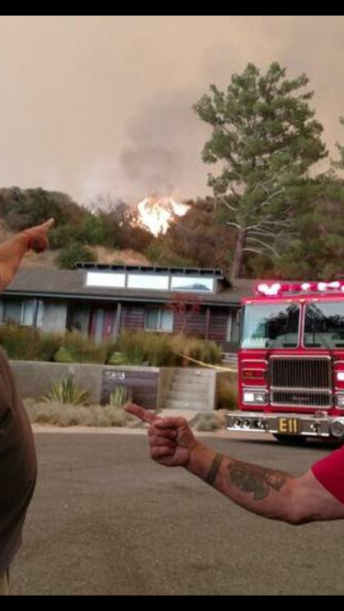
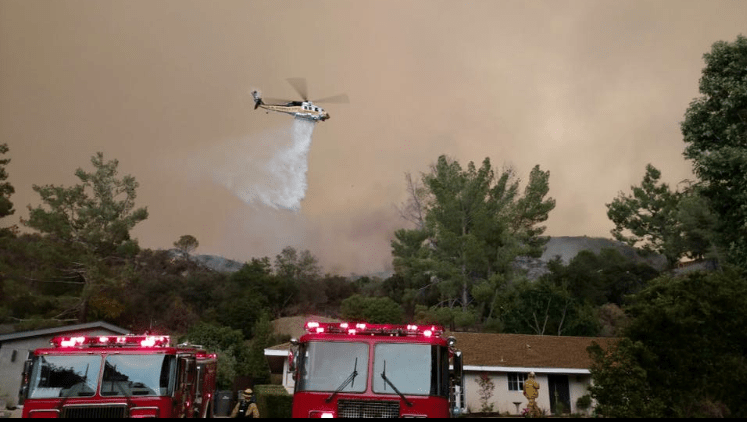
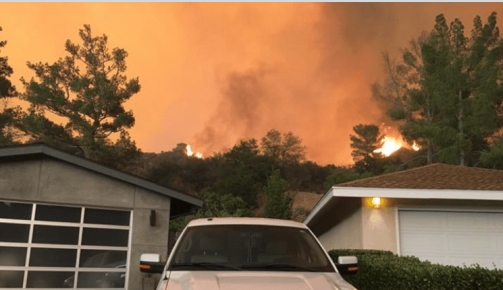
What did you learn from that experience?
Keep between half and a full tank of gas in your car. Keep your keepsakes, important documents, and valuables in one place so you can quickly grab them. Prepare your neighbors for peace (more on that in a moment). And honestly, nobody came to tell us to evacuate; there was no announcement that I was aware of. Sometimes you have to trust your instincts and not necessarily rely on the authorities to tell you what to do.
Why did you become interested in preparing for a disaster?
Because I do live in a place with earthquakes (Southern California, near the San Andreas fault) and that terrifies me. I didn’t think much of it and put it off, even after I had children. Until there was actually a little earthquake one day and I had two little tiny kids in a shopping cart. It made me realize that I would have no idea where to go or what to do or how to get ahold of my husband or how to get home if the roads were blocked. And I was in Walmart, in the camping section, so I was very thankful for that. So I grabbed a few things and left. But that got me thinking that I should really think a lot more about preparedness. So I learned a lot about it, took some classes, and started a website. (Her website is here.)
Let’s start with the two recent devastating hurricane events. How would you advise a family to be prepared for a hurricane and its aftermath?
First, if you live in area prone to hurricanes and if you haven’t taken the time to make sure you’ve assembled an Emergency Supply Kit, build one now! A few other things: board up your windows, fill the bathtub with water, go over the evacuation plan with the family, and know the location of the nearest hurricane shelter. If you are instructed to evacuate, do so! You cannot be certain that help will come later if you find yourself in a deadly situation after evacuations have taken place. Remember to do the following when you prepare to leave home: turn off lights, gas appliances, heating, air conditioning, and ventilation systems, keep refrigerator/freezer turned on (and turn it up to the coldest setting), and of course, lock your home!
(For more information on hurricane preparedness, please go directly to Marla’s website. CNN.com also had a great article on this topic; some of the information above was taken from the article: here.)
What are some questions that individuals and families should be asking about being prepared for a disaster?
What are the dangers we could have locally? What are the natural disasters that may be prevalent in our area? What kinds of man-made disasters could we face? What would I like to do in those situations? Do we want to high-tail it out of town? Where are we going? Is that place stocked with what you need? Natural disasters include hurricanes, tornados, earthquakes, flooding, and wildfires. And in some locations, a tsunami. Man-made emergencies include power grid problems, terrorist attacks, EMPs, etc.
What are some simple ways a family can get prepared?
I think families are loathe to prepare for emergencies because you would rather not think about those difficult scenarios. But I have three words of advice for you: SKILLS TRUMP STUFF. Knowing how to do things is better than having stuff. The first order of business is coming up with a plan. First, come up with a fire exit plan. In about four minutes a fire can be raging and almost impossible to escape. If you live in an earthquake region, practice an earthquake drill.
Figure out where your family is going to meet up in case of a natural disaster or social unrest. Maybe you work in one corner of the city/county, and your spouse works in another area; maybe your kids attend school in another area. How are you getting them? Where are you meeting? What if traffic is blocked up? Do you have good walking shoes in your car? Do your kids have extra water, sneakers, and a food bar in the car? Even schools need to have good supplies in the event of a lock down situation, including a privacy screen.
I will bottom line it for everyone: what are the Top Three Ways to get prepared for an emergency?
First, make a family plan (see above); talk to your family about what you can do to prepare. Learn about what you already have that can prepare you. For example, big garbage bags can line your toilet for sanitation when there is no plumbing (for sewage purposes, if it comes to that). Learn how to get water out of your hot water heater. What are all the water sources in your house? And trust in the Lord. Secondly, make sure you have a 30 day minimum of WATER (one gallon, per person, per day). And if there is a big disaster in the city, the Suburbs are the last area to be addressed. It’s the high density populations that gets addressed first. Where I live, about 40 minute outside of a big city, they told us it will be two to six months before anyone is able to get out here to address anything. That’s a long time. Thirdly, have a month’s worth of food. Start with two weeks and then incrementally increase it.
How do people get started preparing for difficult scenarios?
Start with the basics. Most houses have anywhere between one and two weeks of food. You need to think: how am I going to cook it with no electricity? What is my fuel source? Do I have enough canned food? STORE WHAT YOU USE AND USE WHAT YOU STORE. Rotate your food. Know that children and elderly are more prone to starve in a time of distress. Take small steps. Be a little more prepared today than you were yesterday. Preparing for the apocalypse is completely overwhelming and impossible. Don’t become obsessed and fearful. If you sense the Lord nudging you to become more prepared, that’s wisdom. Take small steps.
What can people do to help their community prepare?
So make your plan for fire exits, make your plan for a couple of natural disasters, then say to your neighbors, “Hey guys! We’ve never met, we just drive into our garage, but I wanted to give you my contact information, if ever there is an emergency or something suspicious, and hey we made a fire safety plan, and one for a hurricane, if you want we can all brainstorm together and be prepared as a neighborhood.”
People don’t love it. They are kinda slow and suspicious. Neighbors can feed and save each other. There are plenty of stories about the Northridge earthquake where everyone pulled their grills together and grilled all of their meat before it rotted and fed the entire community. That’s a beautiful thing. However, 20 percent of the neighborhood will do 80 percent of the work.
What is the number one thing people need access to during a disaster?
Water. You need to access water. You can live three minutes without air, three days without water, and three weeks without food. We came home one day and our water had been off all day. And if that had been prolonged — you realize in those moments where your water is: in your ice cube trays, in the back of your toilet tank (not the bowl!), etc., but how long is that going to last me? You realize how badly you need water for so many things! Watch out for those foil pack waters – they taste wretched after a short period of time, and your kids won’t drink them.
Is it important to have access to a local water source such as a lake? Should you purchase a hiking water filter like Erik and I have for our back-packing trips?
Here’s the challenge: everyone is going to go to that lake or stream to get water. There are really great tools like the UV Water purifier. Like a huge thick pen with a filter; they are battery powered. You can stick it in your cup of water to purify it. Have your bottles of water; have your gallons. Don’t set them straight on concrete, though, because that leeches in. Sometimes you can use tablets and drops.
(Heather’s note: honestly, if this is the one thing you take away from this interview — think about water. Do you have a nearby water source? And do you have a dependable water filter? If not, order a water filter today (google “water filter for back-packing.”) If there is no water source nearby, go buy water at the grocery store and store it in your basement or garage on a shelf.)
Can you talk a little bit about situations that can lead to social unrest?
Extended power outages, “social justice” issues, rioting political protestors, EMPs, terrorist attacks, power grid problems, terrorist attacks. You could have localized black outs with a nuclear power plant problem or an aged electrical grid. I get paranoid about social unrest. I have a quick story: the power went out in a grocery store one night. The doors wouldn’t open; you had to pry the doors open because there was no power. Everything was pitch black except a flickering green light. In a very short time I started to hear people chant, with nervous laughter, “Loot the store!” I left my cart of groceries and got out of there. I got to my car in pitch blackness. Did I have anything to light my path? Or keep me safe? I really didn’t. When you don’t know the time when things will resolve, people get crazy.
I had wished I had a flashlight on my keychain that didn’t need constant pressure to stay on, and maybe a whistle. Happily- I didn’t need either.
But can’t we all go to a cabin in the woods?
A really nice idea, but your biggest problem is actually getting to the cabin. And eventually the hungry hoards are going to come looking for food. People will say “I want an RV.” You can’t go off-roading in an RV. Roads are going to be clogged. What are my back ways of getting there? How much gas do you need? Keep your cars half to three quarters full of gas at all times.
(Heather’s note: everyone will come after the RVs, people, just like in the movies and on TV. But I’m not going to lie, I totally want one anyway! I have heard people say that if the roads are clogged or blocked, try driving over the railroad tracks.)
Marla, let’s talk The Walking Dead. End of the World. Zombie Apocalypse. What then?
Honestly, you’re a goner. I mean, there is nothing you can do for that stuff. It’s going to chaos and mayhem. And you have the Lord; like….that’s it (and really, what more do you need?). Your days are numbered; He knows when your end is going to be. Some, even Christian believers, are like “I will kill anyone I have to – to protect my family.” Others are like “absolutely not. I know where I’m going; if we get taken out, we get taken out. We are not going to wipe someone off the planet before they have a chance to repent and turn to Christ for salvation.” I feel like in those times of crisis it’s an opportunity to lead as many to Christ as possible. It’s our last chance to bring people into eternity. Our life is fleeting and short; this body is temporary. That is what I am trying to tell my girls. If you don’t believe that, I have no help for you.
I fantasize about setting up a bunker; I’m not going to lie. It’s nice to find like-minded people with whom you can live in community if it comes to that. But it is really going to take a lot of financial investment and a lot of educating yourself in order to prepare for that. And is that really what you’re here on earth for? Maybe. Maybe not.
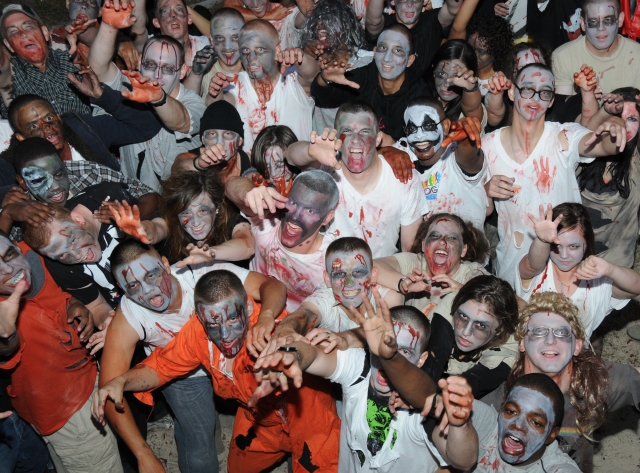
You’ve touched on this a little bit, but should you help people that run out of food in a crisis situation?
That’s lovely, but you only have so much. Also, when people find out that you have food and you help, more people are going to come, most likely. The best thing you can do is to help your community be prepared.
How do you know when it’s time to leave your home?
I always say to my husband: “what is our clue that things are getting bad and we need to high-tail it out of a situation? What would be the catalyst?” So we would leave and have a two week or two month vacation, and maybe we would come back and maybe we won’t. I think that is where you have to be led by the Spirit and not led by fear. It’s a delicate balance. Perfect love casts out fear, but we also want to be prepared and protect our family.
Advice for how the faith community should approach preparedness and social unrest?
Christians have an opportunity to be more prepared for PEACE. So we help those around us more effectively, and be a light in a dark world. Jesus is the prince of peace. We want to be deliverers of that peace. And ultimately knowing that your life is in His hands brings peace.
Joseph’s life is a cool example. God showed him to prepare for hard times ahead and when famine came, not only was Egypt saved but many people from far away received aid.
Closing thoughts?
You cannot avoid the inevitable and unpredictable, but you CAN plan for SOME of it. You have to prepare yourself mentally before you are out of time. Remember two words: peaceful preparedness….anyone who is a little more prepared or has put a little bit more thought into how something might be like is going to be calm when that thing happens. SKILLS TRUMP STUFF. We hate thinking about it….but thinking about it is going to get you further along than buying an emergency pack at Walmart and never looking in it or figuring out what its lacking for you is practically fruitless. Know things.
Preparedness in one sentence?
There is a quote in the book of Proverbs that I think sums up preparedness well: “A wise person sees danger ahead and prepares for it.”
A little bit of wisdom goes a long way.
Thank you Marla for sharing your tips with us!
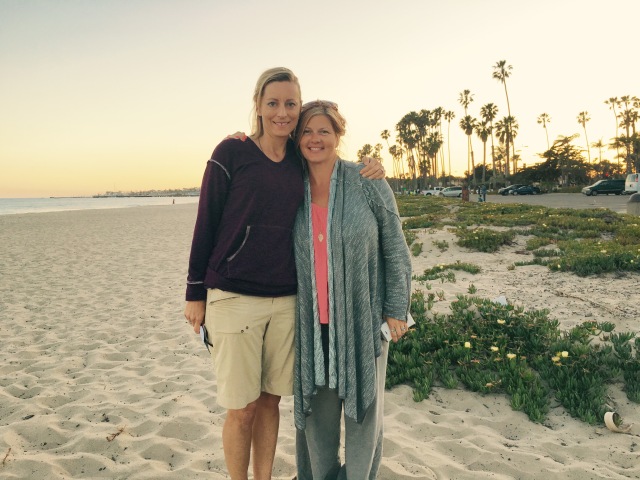
_____________________________________________________
Closing thoughts from Heather:
If you are a back-packer/hiker or love to go camping, you will already have a bunch of preparedness items in your basement or garage (think camp stove, propane, water filter). The one thing I cannot stress enough is: do you have a plan to access water? I think my biggest take away, after interviewing Marla, is that I actually don’t have much of a family plan in place in case of a disaster. My kids go to school across town and in case something happens, and the streets are clogged or shut down, I’m not really sure how to get to them. A couple of other takeaways:
- It’s good to pack sneakers and water bottles (and protein bars) in the car – just in case.
- I’m glad I already have a water filter and live near a lake.
- I’m glad skills are more important than stuff.
- I need to organize all of my keepsakes and important papers in one spot.
- I need to remind the kids about the fire plan we made a long time ago.
- I hope I can get to the grocery store before everyone else does. 🙂
- I have a long way to go.
One last note: when you are making any sort of plan, please don’t forget your pets!!
Thanks for reading!!
_______________________________________________________________
For further resources:
Click here for the Red Cross, which already has emergency kits put together for you: here.
The CDC also recommends you should have an emergency kit prepared. Whether or not you actually do that, scan the list below to make sure you have most of these items around your house in case of an emergency.
Please go to the CDC here.
The CDC recommends the following:
At Least a 3-day Supply of Food and Water
•Water – one gallon per person, per day
(Heather: I am adding in water filter right here.)
•Food – foods that are easy to make and won’t spoil, like canned soup, dry pasta, and powdered milk
•Manual can opener
•Basic utensils to prepare and serve meals
•3-day supply of all medicines, at a minimum
•Medical supplies like syringes, a walking cane, or hearing aids with extra batteries
•Soap
•Toothbrush and toothpaste
•Baby wipes
•Contact lenses or glasses
•First aid kit
•Emergency blanket
•Multipurpose tool (that can act as a knife, file, pliers, and screwdriver)
•Whistle
•Flashlight
•Radio (battery-powered, solar, or hand-crank) for updates on the situation
•Cell phone with chargers
•Extra batteries and cash. Find out where your gas, electric, and water shut-off locations are, and how to turn them off.
There is more to this list, so please visit the website.

Pingback: What I am telling myself at the start of 2021 – Permission 2 Speak Freely
Pingback: Protecting our Girls from Serial Killers – Part I – Permission 2 Speak Freely
Good advice, thanks for sharing.
LikeLike
Thanks mom!!!
LikeLike